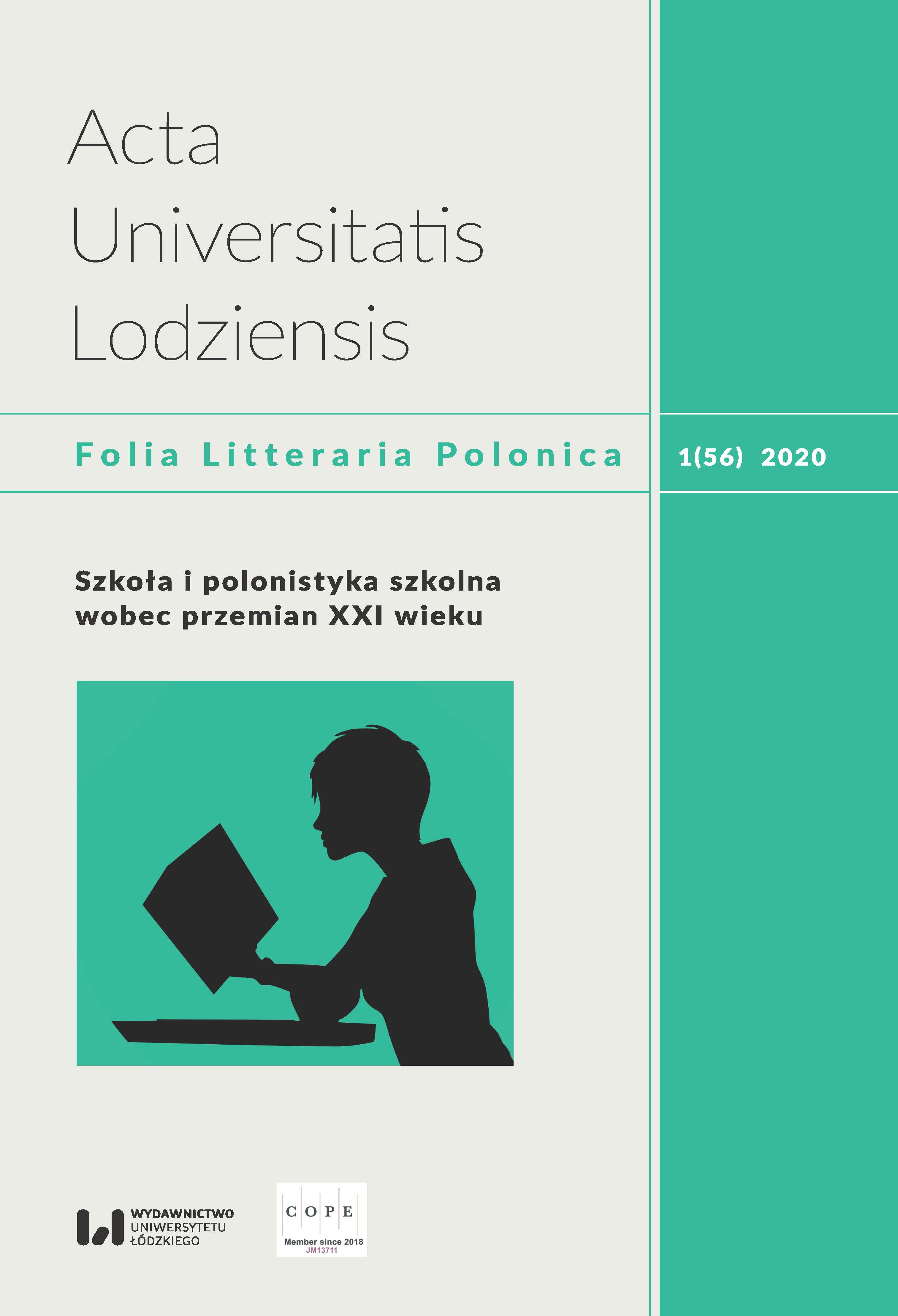Polish philology education in the digital age. Is it still present at Polish schools and universities?
DOI:
https://doi.org/10.18778/1505-9057.56.08Keywords:
digital education, ICT, Polish philological education, e-learning, digital competences of Polish teachersAbstract
This article is an analysis of the use of digital education in Polish philological education, both at schools and at public universities. The author presents how Polish lessons and classes are fulfilled using technology, which electronic resources are worth using in education, and identifies the needs of schoolteachers and lecturers. She also answers the question whether the Polish-language virtual landscape is a natural extension of the social-communication environment to which the young generation is accustomed, and whether education platforms are eagerly used in Polish education.
Downloads
References
Dydaktyka cyfrowa epoki smartfona. Analiza cyfrowych aspektów dydaktyki gimnazjum i szkoły średniej. Raport ekspercki, M. Wieczorek-Tomaszewska (ed.), Stowarzyszenie „Miasta w Internecie”, 29, http://www.ldc.edu.pl/phocadownload/Dydaktyka-cyfrowa-epoki-smartfona.pdf [accessed on: 15.12.2017].
Google Scholar
Innowacyjne zastosowania rozwiązań i narzędzi cyfrowych w kształceniu na poziomie gimnazjalnym i ponadgimnazjalnym w województwie małopolskim, headed by M. Jackowska, Stowarzyszenie „Miasta w Internecie”, 2013, http://mwi.pl/uploads/filemanager/publikacje/innowacyjne%20zastosowania.pdf [accessed on: 15.12.2017].
Google Scholar
Piecuch Aleksander, Dokąd zmierza cyfrowa edukacja?, Edukacja – Technika – Informatyka, 2015, vol. 3, no. 6, pp. 81–88.
Google Scholar
Prensky Mark, “Digital Natives, Digital Immigrants”, From On the Horizon, 2001, vol. 9, no. 5, pp. 1–6.
Google Scholar
DOI: https://doi.org/10.1108/10748120110424816
Siadak Goretta, “Kompetencje cyfrowe polskich uczniów i nauczycieli – kierunek zmian”, Ogrody Nauk i Sztuk, 2016, issue 6, pp. 368–381.
Google Scholar
Statistics Poland, Społeczeństwo informacyjne w Polsce w 2016 roku, https://stat.gov.pl/obszary-tematyczne/nauka-i-technika-spoleczenstwo-informacyjne/spoleczenstwo-informacyjne/spoleczenstwo-informacyjne-w-polsce-w-2016-roku,2,6.html [accessed on: 15.12.2017].
Google Scholar
Szczepaniak-Sobczyk Laura, E-learning w edukacji humanistycznej, Wydawnictwo UG, Gdańska 2016.
Google Scholar
Wobalis Mirosław, Nowe media i technologie cyfrowe w kształceniu polonistów, Wydawnictwo Naukowe UAM, Poznań 2017.
Google Scholar
Biblioteka Cyfrowa Polona, http://www.polona.pl/dlibra [accessed on: 15.12.2017].
Google Scholar
Biblioteka Cyfrowa Uniwersytetu Łódzkiego, http://bcul.lib.uni.lodz.pl/dlibra [accessed on: 15.12.2017].
Google Scholar
Biblioteka Literatury Polskiej w Internecie, http://literat.ug.edu.pl [accessed on: 15.12.2017].
Google Scholar
Biblioteka Wolne Lektury, https://wolnelektury.pl/ [accessed on: 15.12.2017].
Google Scholar
Centrum Edukacji Obywatelskiej, http://www.ceo.org.pl/pl/biblioteka-materialow/jezyk-polski
Google Scholar
Edux.pl, http://www.edukacja.edux.pl/ [accessed on: 15.12.2017].
Google Scholar
E-podręczniki.pl, http://www.epodreczniki.pl/front/education/2 [accessed on: 15.12.2017].
Google Scholar
Instytut Badań Edukacyjnych – Entuzjaści Edukacji, http://bnd.ibe.edu.pl/subject-page/4 [accessed on: 15.12.2017].
Google Scholar
Interklasa. Polski Portal Edukacyjny, http://www.interklasa.pl/portal/index/strony?mainSP=subjectpages&mainSRV=jpolski&page=subjectpage&item=-1 [accessed on: 15.12.2017].
Google Scholar
Platforma Akademii Orange, http://www.akademiaorange.pl [accessed on: 15.12.2017].
Google Scholar
Scholaris. Portal Wiedzy dla Nauczycieli, http://www.scholaris.pl/ [accessed on: 15.12.2017].
Google Scholar
Serwis Język polski, http://język-polski.pl/ [accessed on: 15.12.2017].
Google Scholar
Bandtkie Jerzy Samuel, Słownik dokładny języka polskiego i niemieckiego do podoręcznego używania dla Polaków i Niemców, vol. 1–2, Wrocław 1806, scanned http://www.pbi.edu.pl/ [accessed on: 15.12.2017].
Google Scholar
Knapski Grzegorz, Thesaurus Polonolatinograecus seu Promptuarium linguae Latinae et Graecae, vol. 1–2, Krakow 1643–1644 (2nd edition, corrected and complemented), scanned http://www.mimuw.edu.pl/polszczyzna/Knapski/Knap-ski_DjVu/ (works upon installation of the DjVu suite to be downloaded at http://www.djvu.com.pl/download.php) [accessed on: 15.12.2017].
Google Scholar
Kopaliński Władysław, Słownik wyrazów obcych i zwrotów obcojęzycznych, Warsaw 1967, http://www.slownik-online.pl/ [accessed on: 15.12.2017].
Google Scholar
Linde Samuel Bogumił, Słownik języka polskiego, vol. 1–6, Lviv 1807–1814, scanned http://kpbc.umk.pl/publication/8173 [accessed on: 15.12.2017].
Google Scholar
Słownik języka polskiego, W. Doroszewski (ed.), vol. 1–11, Warsaw 1958–1969, http://sjp.pwn.pl/doroszewski/ [accessed on: 15.12.2017].
Google Scholar
Słownik języka polskiego PWN, https://sjp.pwn.pl/ [accessed on: 15.12.2017].
Google Scholar
Słownik staropolski online (compilation), http://www.staropolska.gimnazjum.com.pl/slownik [accessed on: 15.12.2017].
Google Scholar
Wielki słownik języka polskiego, P. Żmigrodzki (ed.), Kraków 2007, http://www.wsjp.pl/ [accessed on: 15.12.2017].
Google Scholar
Wielki słownik ortograficzny języka polskiego PWN z zasadami pisowni i interpunkcji, E. Polański (ed.), Warsaw 2003, http://so.pwn.pl/ [accessed on: 15.12.2017].
Google Scholar
Downloads
Published
How to Cite
Issue
Section
License

This work is licensed under a Creative Commons Attribution-NonCommercial-NoDerivatives 4.0 International License.











